
Stanley Newcomb Kenton was an American popular music and jazz artist. As a pianist, composer, arranger and band leader, he led an innovative and influential jazz orchestra for almost four decades. Though Kenton had several pop hits from the early 1940s into the 1960s, his music was always forward-looking. Kenton was also a pioneer in the field of jazz education, creating the Stan Kenton Jazz Camp in 1959 at Indiana University.

Frank Rosolino was an American jazz trombonist.
"The Christmas Song" is a classic Christmas song written in 1945 by Robert Wells and Mel Tormé.

Extra Special! is a compilation album by Peggy Lee recorded between 1960 and 1966, with arrangers including. Three songs that Lee co-wrote are featured.
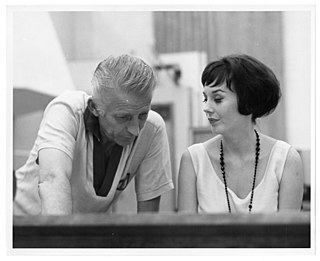
Ann Richards was an American pop and jazz singer. She was the second wife of bandleader Stan Kenton. She had a short career in the late 1950s and early 1960s.

Raelene Claire Claussen, known professionally as Sue Raney is an American jazz singer. Raney was signed by Capitol Records in 1957 at age 17. That same year, she recorded her debut album, When Your Lover Has Gone, produced by Nelson Riddle.
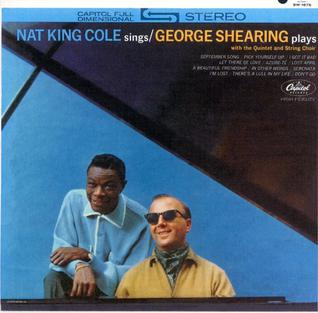
Nat King Cole Sings/George Shearing Plays is a 1962 studio album by Nat King Cole, featuring the pianist George Shearing. Containing new arrangements of two songs that Nat King Cole made famous in earlier versions: I'm Lost and Lost April. The album peaked at 27 on the Billboard album chart.
Johnny Richards was an American jazz arranger and composer scoring numerous sound tracks for television and film. He was a pivotal composer/arranger for cutting edge, adventurous performances and recording sessions by Stan Kenton's big band in the 1950s and early 1960s; such as Cuban Fire!, Kenton's West Side Story and Adventures in Time.

Willis Leonard Holman, known professionally as Bill Holman, is an American composer, arranger, conductor, saxophonist, and songwriter working in jazz and traditional pop. His career is over seven decades long, having started with the Charlie Barnet orchestra in 1950.

Wild Is Love is a 1960 concept album by the American singer and pianist Nat King Cole, arranged by Nelson Riddle. The album chronicles a narrator's attempts to pick up various women before he finds love at the conclusion of the album. The album formed the basis for an unsuccessful musical, I'm With You, that starred Cole and was intended as a potential Broadway vehicle for him. A television special also called Wild Is Love resulted from the album, and was shown in Canada in late 1961. The television special was not shown in the United States until 1964 due to the brief presence of physical contact between the African American Cole and a performer of Canadian European descent, Larry Kert, that was seen as offensive by commercial sponsors.

The Nat King Cole Story is a 1961 album by Nat King Cole. The album was a retrospective of Cole's recording career, designed to present many of his earlier hits in new recordings featuring stereo sound. Cole is accompanied on the re-recordings by many of the notable arrangers and bands that had appeared with him on the original records.

Johnny's Mood is an album by American pop singer Johnny Mathis that was released on July 18, 1960, by Columbia Records and mixes new material in with covers of hit standards by other artists.

Takeshi "Tak" Shindo was an American musician, composer and arranger. He was one of the prominent artists in the exotica music genre during the late 1950s and early 1960s. Shindo also founded a dance band in 1947 and was a frequent lecturer and writer on Japanese music. He first gained prominence for his work on the 1957 motion picture Sayonara, served as the musical director for the television series Gunsmoke, and composed theme music for The Ed Sullivan Show and Wagon Train. He is most remembered for the exotica albums he released from 1958 to 1962, including Mganga! The Primitive Sounds of Tak Shindo (1958), Brass and Bamboo (1959) and Accent on Bamboo (1960). He also released several albums in Japan during the mid-1960s that blended American and Japanese musical traditions. During the 1950s and 1960s, Shindo was a columnist for the Rafu Shimpo covering classical and popular music. In 1980, Shindo made a documentary film, Encounter with the Past, about the Manzanar relocation camp where he was relocated in 1942 as part of the Japanese American internment policy.
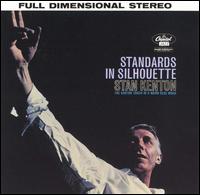
Standards in Silhouette is an album recorded in September 1959 by Stan Kenton and his orchestra. The entire set of arrangements for the LP were written by Bill Mathieu. This recording stands alone in approach and style; Kenton himself only plays on "Django" and every standard is done at a slow, ballad tempo with very sparse, effusive writing.

Adventures in Jazz is an album by the Stan Kenton Orchestra, recorded in late 1961 but not released until about a year later in November 1962. The album won a Grammy Award in the category for Best Jazz Performance – Large Group (Instrumental) category in 1963. This would be Kenton's second Grammy honor in as many years, the first being Kenton's West Side Story winning the Best Large Jazz Ensemble Album in 1962. Adventures In Jazz was also nominated for Best Engineered recording for the 1963 Grammys. The 1999 CD re-issue of Adventures In Jazz is augmented with two alternate takes from the original recording sessions and one track from Kenton's release Sophisticated Approach.
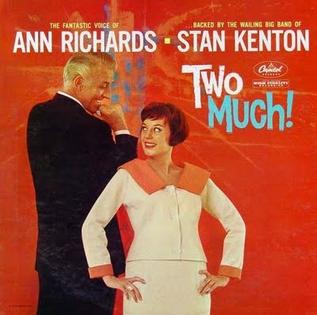
Two Much! is an album by vocalist Ann Richards and the Stan Kenton Orchestra recorded in 1960 and released by Capitol Records, and later on Kenton's own Creative World label.
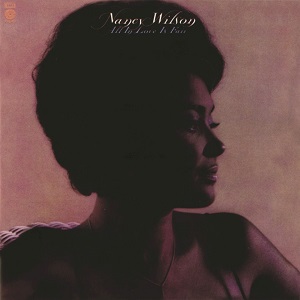
All in Love Is Fair is a studio album by American singer Nancy Wilson, released by Capitol Records in August 1974. It was her first album with producer Gene Page, who also did the arrangements and conducting and gave the album a more R&B-oriented sound. Musicians on the album include Ray Parker Jr., Wah Wah Watson, and Tom Scott. Marvin Gaye is also listed on the back cover as "The Phantom," with "warmest thanks." All in Love Is Fair includes one of the few songs co-written by Wilson.
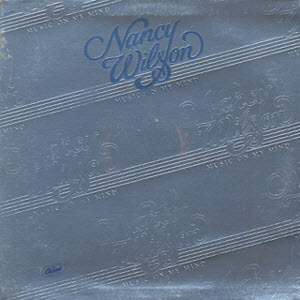
Music on My Mind is a studio album by American singer Nancy Wilson, released by Capitol Records in June 1978. It was produced by Clarence McDonald, with arrangements by Charles Veal, and combined elements of R&B, soul and jazz.

I'm Shooting High is the first solo album recorded by Ann Richards released for Capitol Records in November 1958. The arranger for the session was Warren Barker and all selections for the album were conducted by Brian Farnon.

Losers, Weepers is a studio album by Kay Starr. It was released in 1960 by Capitol Records. It was produced by Dave Cavanaugh. She is backed on the album by Van Alexander and his band. The album's liner notes state: "Kay Starr, working closely and skillfully with the musicians, so that each nuance of lyric, melody, and mood is carried out with full beauty and meaning."


















